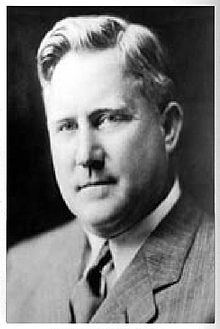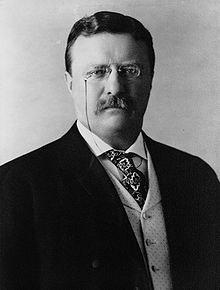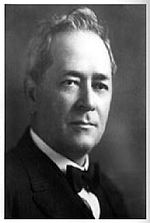- Martin E. Trapp
-
Martin Edwin Trapp 
6th Governor of Oklahoma In office
November 19, 1923 – January 10, 1927Lieutenant none Preceded by John C. Walton Succeeded by Henry S. Johnston Personal details Born April 18, 1877
Robinson, KansasDied July 26, 1951 (aged 74)
Oklahoma City, OklahomaPolitical party Democratic Spouse(s) Lula C. Strang Trapp Profession Teacher, Statesman Religion Disciples of Christ Martin Edwin Trapp (April 18, 1877 – July 26, 1951) was an American politician who served as the first Oklahoma State Auditor under Governor Charles N. Haskell. Later, Trapp served as the third Lieutenant Governor of Oklahoma from 1915 to 1923. When Governor John C. Walton was removed from office, Trapp succeeded Walton as the sixth Governor of Oklahoma.
Contents
Early life
Martin Edwin Trapp was born in Robinson, Kansas on April 18, 1877. Martin would spend the first twelve years of his life in Kansas until 1889. Following the Land Run of 1889, Trapp’s father moved his entire family to Logan County to a claim just seven miles west of Guthrie. Trapp would not attend public school as Oklahoma Territory possessed none. Instead, he was educated almost entirely by association and study with a neighbor named Mr. McDaniel. Trapp would work hard to gain his education, working at local newspaper while doing so. In pursuit of his education, Trapp would, at age 21, become a certified teacher. Trapp would even serve some time as traveling salesman.
Trapp's first state office was that of State Auditor and Inspector under Governor Charles N. Haskell.
Trapp would begin his political career in 1904 when he ran on the Democratic ticket for the Logan County County Clerk, an office he would be hold from 1905 to 1907. During 1907, Oklahoma Territory would be forever changed. On November 16, 1907 Oklahoma Territory officially became the US state of Oklahoma. Trapp would leave County government behind him and would run for, and be elected, Oklahoma’s first State Auditor. Trapp would serve under Charles N. Haskell, the first Governor of Oklahoma, from 1907 to 1911. After his term as State Auditor, Trapp would move to Muskogee, Oklahoma where he would set up a bond business.
Trapp would make a return to Oklahoma politics in 1914 when the Democrats nominated him to serve as the Lieutenant Governor of Oklahoma. Replacing outgoing Lieutenant Governor John A Greer, Trapp would be elected to his new office for three consecutive terms, in 1914, 1918, and for an unprecedented third term in 1922. As the Lieutenant Governor, Trapp would serve under Governors Robert L. Williams, James B. A. Robertson, and John C. Walton. Trapp would only serve for the first 11 months of his third term. On October 23, following impeachment charges against Governor Walton, Trapp became the acting Governor. Walton was found guilty by the Oklahoma Senate in its role as the Court of Impeachment on November 19, 1923. Following the Oklahoma Constitution, Trapp immediately left the office of Lieutenant Governor to be inaugurated as the sixth Governor of Oklahoma.
Governor of Oklahoma
Becoming the first Lieutenant Governor to assume the office of Governor in the State’s history, Trapp was Walton’s opposite. Whereas Walton had been progressive and aggressive, Trapp was quiet and conservative. Top on the new Governor’s to-do list was trimming the state’s budge to provide for a more efficient state government. Immediately upon coming into office, Trapp called the Oklahoma Legislature into special session to address the issue. An investigation of many state offices, commissions, and departments soon followed. In true conservative form, Trapp removed many state organizations that where, in his opinion, of little use to Oklahoma and provided much needed reorganization of the inflated state government.
Trapp succeeded in having the Legislature repel over $10,000,000 in expenditures that Walton had set up, thus restoring the State’s credit. Unfortunately, this meant repelling the state’s new free text book program and a one third reduction in the funds spend on school aid. Through the use of a three cent gasoline tax, Trapp raised enough funds to finance Oklahoma’s first Highway Commission. This Commission oversaw Oklahoma’s much needed highway construction program.
 Governor Trapp would follow in Theodore Roosevelt's footsteps in his desire to establish conservatism in Oklahoma.
Governor Trapp would follow in Theodore Roosevelt's footsteps in his desire to establish conservatism in Oklahoma.
Following a growth national trend started by US President Theodore Roosevelt back in 1907, Trapp began a program of economic conservatism. Trapp created the Oklahoma Forestry Commission, the Oklahoma Conservatism Commission, and the Oklahoma Fish and Game Commission out of his desire to preserve the environment. Trapp expanded the term lengths of all county offices from two years to four, enacted a state drainage law to protect the state from floods, and raised the cost of licenses in the state.
Trapp also proved to be an effective law enforcement officer. For the first time in the state’s history, a State Bureau of Criminal Investigation was established in 1925 from pressure from Trapp’s administration. Trapp asked the Legislature for harsher punishment and stricter enforcement of prohibition, which he received. Trapp also tackled the growing power of the Ku Klux Klan by passing an anti-mask law which eventually reduced the group’s power.
Reelection Issue
Throughout his term, Trapp had viewed his position as “acting Governor”, and not the actual Governor. Throughout his term, Trapp had proved a capable administrator and had become widely popular, with many agreeing that Trapp should seek retention in office. This proved to be a problem for Trapp when he desired to seek reelection in the fall of 1926. State law had forbidden the Governor from succeeding himself, and thus Trapp was ineligible for reelection. Trapp insisted that the law did not apply to him since he had been elected Lieutenant Governor and succeeded to the Governorship only upon the impeachment and removal from office of John C. Walton.
The Oklahoma Supreme Court investigated the issue. On June 6, 1926, the Court ruled on the case Fitzpatrick v. McAlister, which stated that Trapp was "the Governor for the simple reason that he governs. He governs officially for the reason that section 16 expressly vests him with authority to do so. Therefore he is the official Governor, and, being the official Governor, he is rendered ineligible to succeed himself by the inhibition contained in section 4, art. 6, of the Constitution.” Thus, Trapp was ineligible to run for reelection.
Trapp officially ended his term in office on January 10, 1927 with the inauguration of Henry S. Johnston as the seventh Governor of Oklahoma.
Death and legacy
After leaving the Governorship, Trapp would continue to play a key role in the Democratic Party in Oklahoma despite the fact that he would never hold another political office. Trapp would once again seek election to the Governor’s office in 1930, but he would not receive the Party’s nomination, losing it to the colorful and popular William H. Murray. Moving back to Oklahoma City, Trapp would spend the rest of his life as a dealer of investment securities. Trapp would die on July 26, 1951 in Oklahoma City at the age of 74. He would be buried in Fairlawn Cemetery in Oklahoma City.
Trapp was responsible for many positive programs in Oklahoma’s history. With the establishment of the State Bureau of Criminal Investigation, Oklahoma’s law enforcement agencies gained an invaluable ally in law enforcement. Conservatism was brought to Oklahoma for the first time under Trapp’s administration, with much of Oklahoma’s environment being preserved for later generations. Even racial issue such as the KKK where dealt with under Trapp. However, the thing that Trapp is most remembered for is being the first Lieutenant Governor to ascend to the Governorship following the impeachment of removal from office of John C. Walton.
State of the State Speeches
References
- Governor Martin E. Trapp
- Short biographies of all Governors from Territorial to present
- State biography of Governor Trapp
Political offices Preceded by
NoneOklahoma State Auditor
1907–1911Succeeded by
Fred ParkinsonPreceded by
J.J. McAlesterLieutenant Governor of Oklahoma
1915–1923Succeeded by
vacantPreceded by
John C. WaltonGovernor of Oklahoma
1923–1927Succeeded by
Henry S. JohnstonGovernors of Oklahoma 
Territorial (1890–1907) 
State (since 1907) Italics indicate acting governors Lieutenant Governors of Oklahoma 
 Categories:
Categories:- 1877 births
- 1951 deaths
- People from Brown County, Kansas
- People from Logan County, Oklahoma
- People from Muskogee, Oklahoma
- State Auditors of Oklahoma
- Lieutenant Governors of Oklahoma
- Governors of Oklahoma
- American Disciples of Christ
Wikimedia Foundation. 2010.

